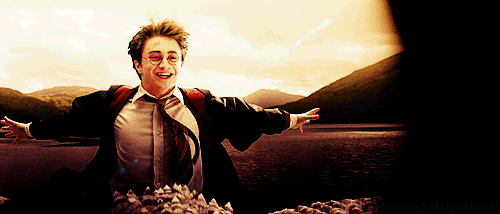Tonight, I went to the premiere of the first installment in the five-film series, Fantastic Beasts and Where to Find Them. Decked out in my Hufflepuff sweater and having listened to the Sorcerer’s Stone soundtrack on the ride to the theater, it’s possible I was a bit excited.
And by a bit excited, I mean when the Warner Brothers symbol came on screen I started to cry.
Now it’s three a.m., I have class in five hours and a Russian test in the afternoon, but I’m capable of thinking of nothing but newt Scamander and my never-ending love for the wizarding world.
In my senior year of high school, my AP Lit teacher and I had quite a few discussions on whether or not Harry Potter should be added to the official list of literature AP students are allowed to use in their essays to demonstrate their understanding of literature, as had recently been proposed. Many people laughed off the idea, because it’s a children’s fantasy series, but I think that’s brushing it aside too easily. I can’t think of another book or series with this kind of impact on millions of people--a series that practically defined many of our childhoods.
I have friends that haven’t read the books, haven’t seen the movies, and they completely don’t understand what it is that makes HP fans so relentless in their passion for the series, they don’t understand how we can discuss things like houses so seriously and apply scenes from the books in everyday life--it was only a series about magic.
And yes, it was a series about magic--but also a series so wholly intent on delving into self-discovery and good versus evil, on family and friendship, shaping one’s path and facing the challenges before you. It’s crazy that the eleven year old with the lightning scar has grown to the wonder we know today, and I know there have been countless days I’ve questioned why this particular story has become such a foundational aspect of our generation.
The books. The movies. The theme park. Now an entire new series, based on snippets of history and a first year textbook.
While those things expanded the franchise, and the media attention expanded the fandom, I don’t think that’s it.
Harry Potter started in one woman’s mind and written on napkins, and has become an astounding phenomenon because we love the characters. We grew up with them, we go back and reread and rewatch as we revisit the pivotal moments, the frustration and happiness and magic. I read the series for the first time in the fourth grade, and I learned something then, and I read it this past summer after graduating high school, for somewhere around the twelfth time, and I still learned something.
It’s amazing, isn’t it? I love Dickens and Shakespeare as much as any book nerd, and I think their works are definitely important to read, but the Harry Potter books have taught me just as much, if not more--friendship, loyalty, equality, sacrifice, kindness, justice, wisdom, determination, achieving your goals. There’s a reason I make a reference to the series in almost every situation of my life, and that’s because it’s possible to do so! Nearly everything I’ve learned about life is reflected somewhere in one of the books, the magic is but a backdrop to liven things up that readers might stay invested long enough to grasp the mind blowing themes and concepts JK managed to weave through dragons and warfare. I’ve read countless books, and yet none of them have managed to capture so well the reality of how complicated human beings are: that no one is purely good or bad, that you must understand those you fight against to ever be successful, that it takes all kinds of people working together to triumph. Names like Gryffindor, Slytherin, Ravenclaw, and Hufflepuff sound absurd, but replace them with the qualities their bearers possess and they just as easily become the lesson of every coming of age story, every inspirational speech.
They’re books, and I could talk for hours about how much I adore Hermione, or how Cedric and Fred didn’t deserve it and Molly is an aspiration for us all; but I could also talk for hours about the implications of the similarities between Harry and Tom, James and Severus, or Harry and Draco, and how much they speak on decisions shaping good vs evil, the writing of love as the most powerful force metaphorically and physically, or the prohibition of some literature and self defense being the first steps taken by a hostile government as a threat reappeared in their world--there is so much meaning. My best friend and I have been talking about these books for years and we still realize new connections between the books and reality on a weekly (and sometimes daily) basis.
Books can be much more than merely books, words are much more powerful than strings of letters, and as we’ve seen, Harry Potter is, and always will be, infinitely more than a series about a boy wizard.



















